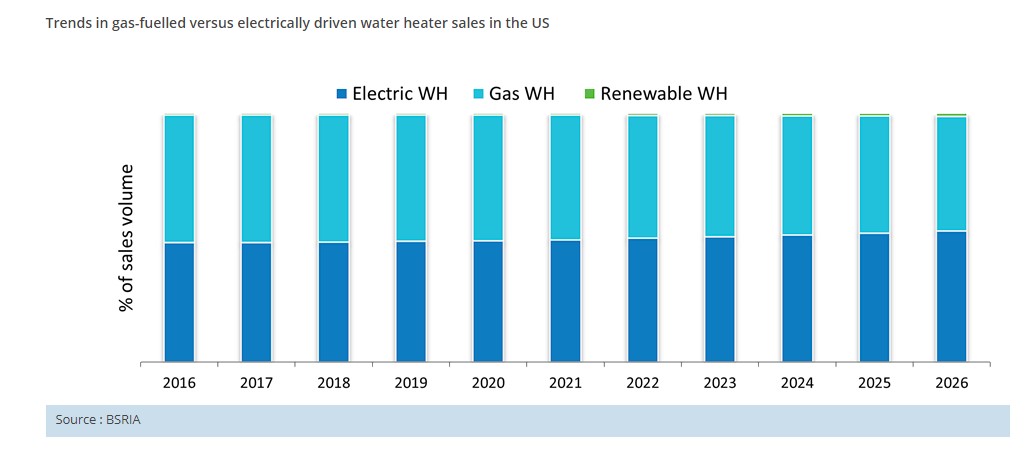US water heating market update 2021

|
With 1.3 million gas water heaters sold to Californian homes – or one quarter of the US market – it is no surprise the impetus for tighter building regulations came from the West. In July 2019, Berkeley, California became the first city in the nation to ban natural gas connection in new construction and large renovation projects. Brookline, Massachusetts, Seattle and 42 cities and counties in California also announced gas phaseouts.
Oregon became the second state, after Washington, to adopt a standard for grid-enabled water heaters. The standard requires electric water heaters to be able to automatically adjust their power usage in response to changes in electricity prices or the needs of the power grid. Nevada legislators authorised their state energy office to adopt similar grid-enabled standards for energy-intensive appliances like air conditioners and water heaters.
While some states are adopting increasingly ambitious clean electricity standards and/or greenhouse gas emissions reduction goals to move away from fossil fuels, opposition remains strong. Laws to protect natural gas use have been adopted in Arizona, Louisiana, Oklahoma and Tennessee. Similar laws have been proposed in Texas, Florida, Georgia, Iowa, Kansas, Missouri, Pennsylvania, Utah, Indiana, Arkansas, Kentucky and Mississippi. Considering half of the US water heating market is driven by the sales of gas-fuelled units (USD 3.9 billion in 2021), industry experts foresee a slow shift in technologies.
BSRIA’s research points towards moderate acceleration of sales of electric storage water heaters, whereas those of all gas-driven units have been forecast to plateau in the coming years.
The imbalance between the cost of gas and electricity is a clear obstacle to the refurbishment of systems. As most buildings in the US were built before the 1980s, additional enhancements of the building structure are often required to accommodate new technology, adding to the final bill.
Another trend emerging in both the residential and the commercial water heater market is the gradual rise of gas-fired condensing technology, for both storage tank and tankless type water heaters. The upgrade of gas water heater is growing to meet energy efficiency standards.
More information on the world residential and commercial water heating markets is available from BSRIA’s library of reports.
This article originally appeared under the headline, 'Water heating market update 2021' on the BSRIA website. It was published in November 2021.
--BSRIA
[edit] Related articles on Designing Buildings
- American architecture and construction.
- BSRIA articles on Designing Buildings.
- Greenhouse gases.
- Heating ventilation and air conditioning HVAC.
- Hot water.
- Natural gas.
- Types of domestic heating system.
- Water heating.
[edit] External resources
Featured articles and news
Apprenticeships and the responsibility we share
Perspectives from the CIOB President as National Apprentice Week comes to a close.
The first line of defence against rain, wind and snow.
Building Safety recap January, 2026
What we missed at the end of last year, and at the start of this...
National Apprenticeship Week 2026, 9-15 Feb
Shining a light on the positive impacts for businesses, their apprentices and the wider economy alike.
Applications and benefits of acoustic flooring
From commercial to retail.
From solid to sprung and ribbed to raised.
Strengthening industry collaboration in Hong Kong
Hong Kong Institute of Construction and The Chartered Institute of Building sign Memorandum of Understanding.
A detailed description from the experts at Cornish Lime.
IHBC planning for growth with corporate plan development
Grow with the Institute by volunteering and CP25 consultation.
Connecting ambition and action for designers and specifiers.
Electrical skills gap deepens as apprenticeship starts fall despite surging demand says ECA.
Built environment bodies deepen joint action on EDI
B.E.Inclusive initiative agree next phase of joint equity, diversity and inclusion (EDI) action plan.
Recognising culture as key to sustainable economic growth
Creative UK Provocation paper: Culture as Growth Infrastructure.
Futurebuild and UK Construction Week London Unite
Creating the UK’s Built Environment Super Event and over 25 other key partnerships.
Welsh and Scottish 2026 elections
Manifestos for the built environment for upcoming same May day elections.
Advancing BIM education with a competency framework
“We don’t need people who can just draw in 3D. We need people who can think in data.”























Comments
The cost of green electricity has to be made cheaper than gas but still we are comparing the cost of electricity generated by renewable sources with fossil fuels. Instead we should be showing how green electricity is cheaper per kwh than gas.The cost of green electricity has to be made cheaper than natural gas.